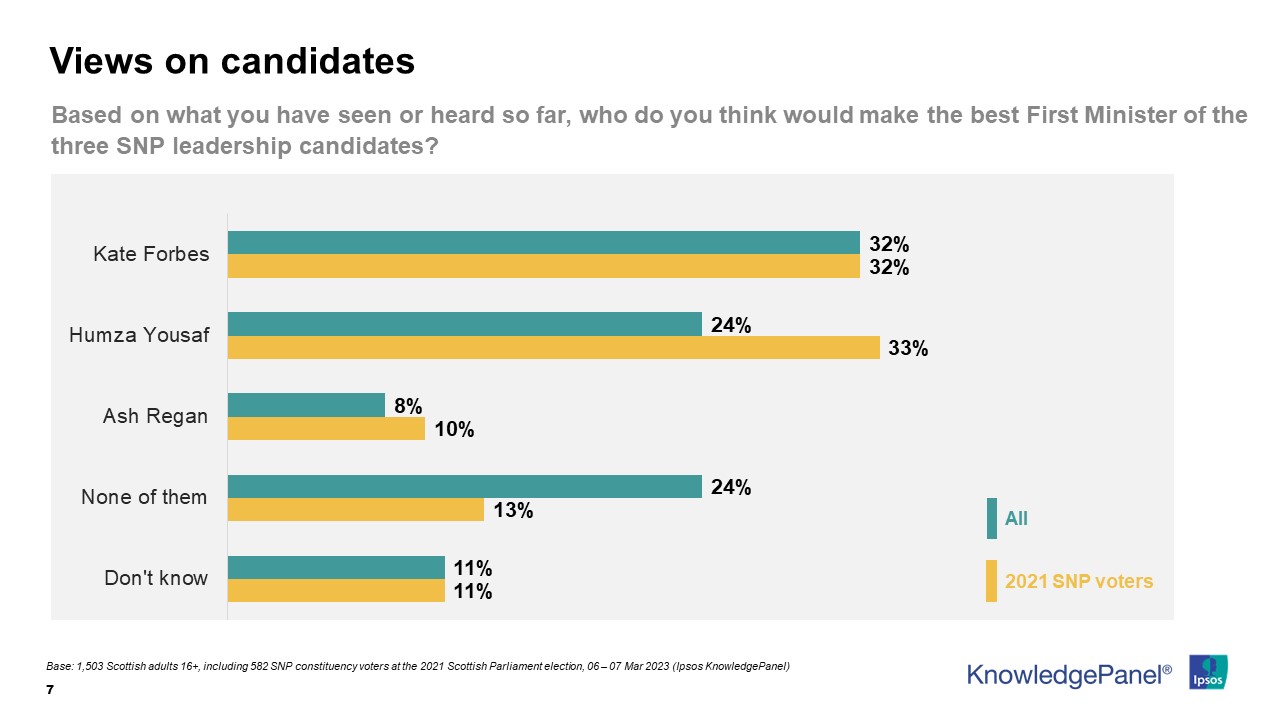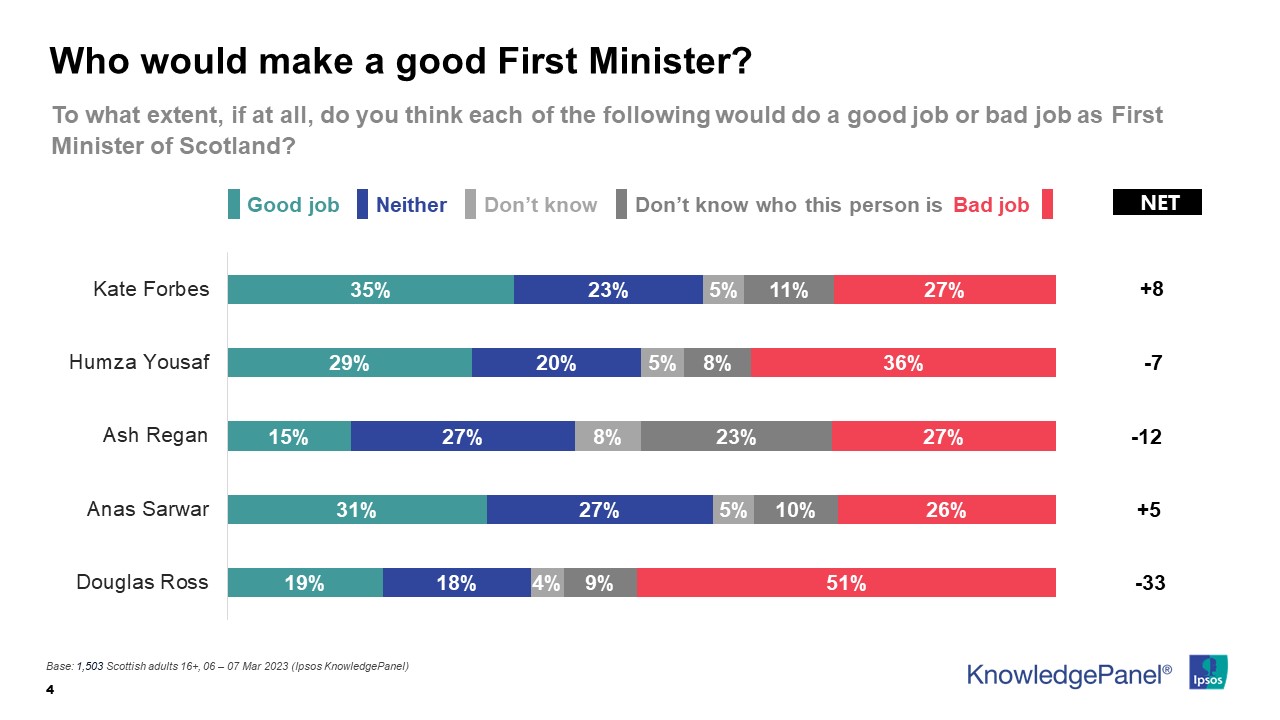Forbes leads as the public’s preferred next First Minister, but Yousaf and Forbes are neck and neck among SNP voters
New polling conducted on behalf of Channel 4 News from the Ipsos KnowledgePanel taken between 6th and 7th March, finds that:
- One in three SNP voters (33%) say Humza Yousaf would make the best First Minister of the three SNP candidates, while another one in three (32%) say the same of Kate Forbes
- Forbes takes an 8-point lead over Yousaf among the general public, although overall ratings are lukewarm: one in three say either that none of the candidates would make the best First Minister or that they don’t know
- Public want to hear about candidates’ plans for the NHS and the cost of living
- Nearing three in five of the public say they feel uncomfortable about politicians voting on policies that affect people’s marriage and relationships according to their personal religious beliefs.
Preferred next First Minister of Scotland
Almost one in three of the public (32%) pick Kate Forbes as the best First Minister of the three candidates. She is followed by Humza Yousaf, who 24% say would make the best First Minister, while 8% think that Ash Regan would be the best First Minister. There is a clear pattern by age, with younger people more likely to prefer Yousaf and the over 55s more likely to prefer Forbes.
However, the race is too close to call between Humza Yousaf and Kate Forbes when looking at the views of SNP voters from the last Scottish Parliament election. Among SNP voters 33% say that Humza Yousaf would make the best First Minister while 32% say the same of Kate Forbes. Ash Regan takes third place with just 10% saying she would make the best First Minister.

When asked what they would like to hear the leadership candidates discuss, the NHS and the cost of living are at the forefront of the public’s mind, mentioned by 81% and 76% respectively. This is followed by 59% wanting to hear about their plans for growing Scotland’s economy and 55% about their plans for education and schools.
SNP voters from the last Holyrood election are also most keen to hear about the NHS and the cost of living, but are then more likely to mention plans for securing Scottish independence (60%, compared with 29% of the public overall), followed by growing Scotland’s economy (58%) and reducing poverty and inequality (57%).
Just 12% of the public say they want to hear about the candidates’ plans for transgender rights/ the Gender Recognition Act, rising to 16% among SNP voters.
Who would do a good job as First Minister of Scotland?
While SNP voters are more likely to say that Humza Yousaf would do a good job as First Minister than they are to think Kate Forbes would do a good job, the reverse is true of the wider Scottish public. Almost half of SNP voters (48%) say that Yousaf would do a good job, compared with 42% who say the same of Forbes. Among the general public, however, Forbes fares better, with 35% saying she would do a good job as First Minister and 27% that she would do a bad job. That compares with 29% who say that Yousaf would do a good job and 36% that he would do a bad job.
The results suggest Kate Forbes currently has broader appeal among the electorate than Humza Yousaf, with more Conservative voters thinking she would do a good job as First Minister (39%) than that she would do a bad job (28%). In contrast, just 7% of Conservative voters think that Humza Yousaf would do a good job as First Minister, and 74% think he would do a bad job. Forbes also leads Yousaf among Labour voters: although more Labour voters think each candidate would do a bad job than would do a good job, 26% say that Forbes would do a good job, compared to 17% who say the same of Yousaf.

Ash Regan currently struggles with name recognition among the public, with almost 1 in 4 saying they do not know who she is. Just 15% of the public think she would do a good job as First Minister, rising to 23% among SNP voters.
Kate Forbes leads Scottish Labour leader Anas Sarwar by 4 points when it comes to who the public think would do a good job as First Minister, with 31% saying that he would do a good job. Sarwar in turn is marginally ahead of Humza Yousaf among the Scottish public, as fewer think that he would do a bad job as First Minister (26%) than think that Yousaf would do a bad job (36%).
Scottish Conservative leader Douglas Ross is unpopular among the Scottish public, with half saying he’d do a bad job as First Minister. However, both Sarwar and Ross are viewed more positively by their own party’s voters than any of the SNP candidates are by SNP voters.
Standing up for Scotland’s interests
Kate Forbes emerges as the most trusted of the three SNP candidates for First Minister to stand up for Scotland’s interests. Over half (53%) trust her a great deal or fair amount to stand up for Scotland’s interests in discussions with the UK Government, compared with 47% who trust Humza Yousaf to do this and 34% who trust Ash Regan to do the same. Among SNP voters, Forbes and Yousaf are both well regarded when it comes to standing up for Scotland’s interests: 63% trust each of them to do this, while 44% trust Ash Regan to do the same.
Impact on likelihood of Scotland becoming independent
The most common response both among the public and among SNP voters specifically is that whichever candidate becomes First Minister, they will make no difference to Scotland’s likelihood of becoming independent. SNP voters see the prospects of Scotland becoming independent as slightly higher if Kate Forbes becomes First Minister than if Humza Yousaf or Ash Regan does: 20% say that Forbes becoming First Minister would make it more likely that Scotland will become independent, while 20% say it would make it less likely and 46% that it would make no difference either way. Slightly fewer think that Scotland will be more likely to become independent under Humza Yousaf (15%) or Ash Regan (12%).
Personal religious beliefs influencing how politicians vote
Around three in five of the public (57%) say they feel uncomfortable about politicians voting on policies that affect people’s marriage and relationships according to their personal religious beliefs, while 18% say they feel comfortable with this. This rises to 61% feeling uncomfortable with this among SNP voters. Young people are especially likely to feel uncomfortable with politicians voting on policies of this nature according to their personal religious beliefs, with two in three (66%) 16-34 year olds saying they feel uncomfortable with this and just 13% that they feel comfortable with it.
Emily Gray, Managing Director of Ipsos in Scotland, commented:
As the candidates prepare to go head-to-head in the Channel 4 News leadership debate, the Scottish National Party membership continues to weigh up whether to back Kate Forbes – currently slightly preferred by the public as a whole - or Humza Yousaf, who is neck and neck with Forbes among their own voters. Ash Regan struggles with limited name recognition among the public. Whoever prevails as First Minister will have a weighty in-tray, with the NHS and the rising cost of living at the forefront of voters’ minds, along with the importance in SNP voters’ eyes of setting out a strategy for how the SNP will secure independence.
Technical note
- This data has been collected by Ipsos’s UK KnowledgePanel, a random probability panel which provides gold standard insights into the UK population, by providing bigger samples sizes via the most rigorous research methods
- Ipsos interviewed a representative sample of 1,503 adults aged 16+ in the Scotland. Interviews were conducted online on 6th and 7th March 2023.
- Data are weighted to match the profile of the population. All polls are subject to a wide range of potential sources of error.



